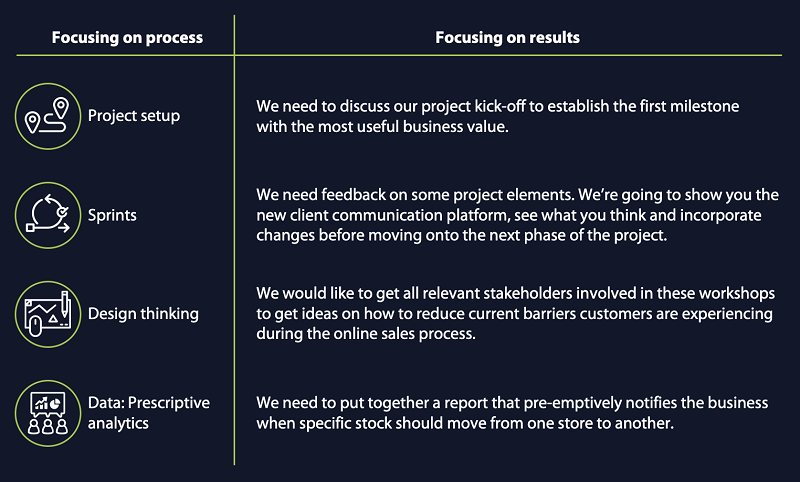Stop disorienting business with elaborate processes
- 17 April, 2020
- Article - Software Best Practices
As technology specialists, we often find our teams focusing on processes and working models. These processes are the basis of how we solve problems and we often like to share (in detail) how we work. However, even though these elaborate processes are important to achieve the end goal, our stakeholders often have no interest in these models they do not understand.
This does not mean that your process or recipe for success is not important. In fact, the right process can make or break a project. The lesson here is to avoid focusing on granular processes and rather focus on the outcomes instead when dealing with customers, or stakeholders from business or product areas.
You need to adapt to their language – not the other way around.
Your method of working is important to you and your team, but it’s more important to have conversations with your stakeholders in their language. This is especially meaningful at the start of a project. Rather than trying to sell a detailed process of how your team is going about solving each problem, gain their trust by showing that you understand their business and objectives instead. Reciprocating an understanding of context, circumstances and business objectives is a real confidence builder.
It’s easier to communicate with business when there is a shared frame of reference in place. This way, clear expectations are created. The below table has some examples on how to translate your method into a valuable message that your stakeholders will understand.

Your process is generic. Rather acknowledge your client’s specific problem.
If you consider a method such as design thinking, it can solve practically any problem when applied correctly. Your stakeholders don’t want to know about a process you’ve used multiple times before, because it comes across as a generic solution and not something tailored to their unique problem. Focusing on the process rather than the result is usually a sign of not knowing the client or problem well enough. Your customer knows that it’s much easier to talk about a process that you are familiar and comfortable with. If you have spent enough time and energy to do targeted research and ask questions about the business context and objectives, it becomes easier to focus on the outcome.
Don’t sell your process – let them experience it.
Ultimately if you succeed, customers and stakeholders will naturally enquire about the processes you followed to achieve it. Once they start enquiring about it, they will start advocating for it themselves and do the selling on your behalf. Telling your customer how great your process is, is one thing, but having them telling others about your methods is substantially more valuable.
Emphasising the value in your process is not always useful, describing business outcomes is. Technology teams should make the effort to adapt to business and gain their confidence by showing interest in results, rather than trying to make a sale in a language they don’t understand.



